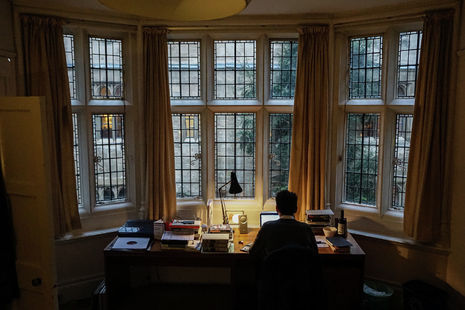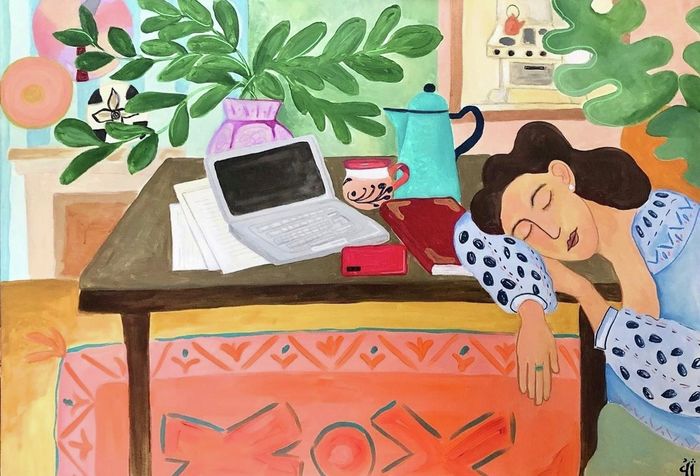On self-care: going more than skin deep
Aimee Hallswoth argues that our current short term understanding of self-care practices fall short in tackling our long term problems

What does the phrase ‘self-care’ mean to you? Is it a night spent with friends after a stressful day? Maybe it’s watching an episode of Gilmore Girls with a cup of hot chocolate, escaping to somewhere comfortable through Netflix. It could be as simple as putting on a face mask once a week to unwind. But should we be going deeper than bath bombs and lavender reed diffusers when we’re trying to engage with wellness practices? It could be time to revaluate the ways in which we take care of ourselves.
"So why has self-care been relegated to the realm of Friday film nights and shelves of Lush bubble bars?"
Often, self-care that promotes long term wellbeing can be hard work. It can mean confronting messy emotions and past traumas, and it often requires a deal of self-reflection to really develop a sense of inner peace. That’s not to knock the power of a good face mask, but healing and really taking care of ourselves is a full-time occupation. So why has self-care been relegated to the realm of Friday film nights and shelves of Lush bubble bars?
It may have something to do with the way we currently relate to productivity. Endless articles can be found online about how to get more done, how to grind harder and how to be better. But being better in this mode of thinking is essentially defined by output. Taking time for ourselves is therefore rendered as time wasted, an obstacle in the way of more work. We have made productivity a fetish. You can see this refracted endlessly in Pinterest aesthetic boards full of immaculate desk setups and even in TikTok trends like the ‘that girl’ videos that were sweeping the app earlier this year. But waking up at 6am and drinking endless gallons of green juice aren’t going to magically fix broken relationships with our work. When we are inspired by trends that posit productivity as the key to happiness, we innately tie our wellbeing to our labour.
"She stated that “I had to redefine myself outside of what I did for a living.” These are powerful words and all too relatable. When we begin to define ourselves by our work, we often lose sight of ourselves in the process."
This is the kind of mindset that breeds guilt when we take time for ourselves that isn’t innately ‘productive’, and time spent recharging is often only thought about as a pause in between working. This is a lifestyle that encourages us to push ourselves into burnout. It’s no wonder that we only block out an evening a week for self-care because we are encouraged to view this element of our lives as secondary to our work, rather than something just as essential. In her brilliant TedTalk ‘The Missing Ingredient in Self Care’, Portia Jackson Preston describes how it took her experiencing serious illness to slow down and re-evaluate her relationship to her work. She stated that “I had to redefine myself outside of what I did for a living.” These are powerful words and all too relatable. When we begin to define ourselves by our work, we often lose sight of ourselves in the process.
This issue is only intensified in the Cambridge bubble. Cambridge culture is no stranger to the productivity fetish, and within the university it often becomes a competition to see who can do the most. Some claim bragging rights over their long-haul library sessions and the huge quantity of secondary material they’ve researched into the night. Indeed, the structure of triposes themselves can encourage this thinking by pitting students against one another in a ranking system. This seems more often than not to breed insecurity rather than bolster academic performance, encouraging students to push themselves into burnout and despair in the pursuit of academic achievement. Our view of personal value becomes symbolised by a class mark. This is shown in how students react to their results on Camfess, confessing disappointment in gaining 2:1s instead of firsts. Thus, our studies and experience at Cambridge come to be viewed not as a form of exploration but as a process of production – steps on the ladder to a first. The sense of excitement that comes from crafting an essay can be flattened when we only think of the process in terms of the end result.
The same thinking applies to self-care. When we only think of self-care as a quick pause before we move back into a hectic schedule, we haven’t truly spent time recharging and healing. We need to stop thinking of self-care as secondary to our work but as an essential part of our lives. It can be a source of self-reflection, a time of rest and time to simply stop. To let ourselves be quiet. Sometimes silence doesn’t have to be filled.
The good news is that we are starting to make headway with our mental health literacy and in dealing with the problems of burnout. The university is starting to make concrete headway in realising how important self-care really is; a mindfulness course was introduced in Easter 2021 that encouraged both staff and students to take time simply being with and prioritising themselves. The conversation around reframing self-care is starting to move away from bath bombs and towards cultivating a good relationship with ourselves in the long term. It seems we’re finally ready to go more than skin deep.
 News / Uni Scout and Guide Club affirms trans inclusion 12 December 2025
News / Uni Scout and Guide Club affirms trans inclusion 12 December 2025 News / Cambridge Vet School gets lifeline year to stay accredited28 November 2025
News / Cambridge Vet School gets lifeline year to stay accredited28 November 2025 News / Cambridge study finds students learn better with notes than AI13 December 2025
News / Cambridge study finds students learn better with notes than AI13 December 2025 Science / Did your ex trip on King’s Parade? The science behind the ‘ick’12 December 2025
Science / Did your ex trip on King’s Parade? The science behind the ‘ick’12 December 2025 News / Pembroke to convert listed office building into accom9 December 2025
News / Pembroke to convert listed office building into accom9 December 2025








